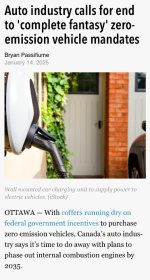Of the 25.7 million vehicles currently registered in Canada, just under 330,000 are fully electric. That’s about 1.3%.
Nearly 6% of new cars being sold are currently EVs (although that market has stagnated). However, of the entire Canadian fleet – new and used – just over 1% are battery-electric. There just aren’t that many EVs in Canada, certainly not enough to justify the waste of all those taxpayers’ billions being lavished on the industry by “green” politicians such as Justin Trudeau, Ontario Premier Doug Ford and Quebec Premier Francois Legault.
The Liberal government’s forced transition to EVs just isn’t working. Sales of EVs would have to nearly triple next year to meet the Trudeau government’s regulation dictating that 20% of vehicle sales must – must – be EVs by 2026. They would have to increase 10-fold to hit the mandate of 60% by 2030 and rise 15-fold to hit 2035’s 100% mandate.
Over the next decade, EV technology will improve. Batteries will propel vehicles farther on a charge. Charging times will be reduced and maybe even costs will come down. But not by enough or fast enough to meet the environmental fantasizing of Trudeau and his hardline Environmental Minister Steven Guilbeault.
Canada is a big country with lots of winters, so even with improvements in EV technology, it’s hard to imagine electrics will replace good, old, reliable gasoline- and diesel-powered vehicles anytime soon.
Most major manufacturers have pulled back sharply on EV production since the beginning of the year because the market for electrics just isn’t there. Last week, BMW CEO Oliver Zipse, said that if the EU maintains its EV mandate (which matches Canada’s), it will lead to “massive shrinkage of the (automobile) market.”
But maybe that is just what the Liberals want – far fewer people owning far fewer cars.
The Trudeau government’s own internal research shows their EV mandate will likely price a quarter or more of Canadians out of the car and truck market entirely.
There are two ways to get to 100%. Either you continue to sell current levels of new vehicles and subsidize EVs like hell. Or you sell far fewer cars, but they’re all electric.

 apple.news
apple.news
Nearly 6% of new cars being sold are currently EVs (although that market has stagnated). However, of the entire Canadian fleet – new and used – just over 1% are battery-electric. There just aren’t that many EVs in Canada, certainly not enough to justify the waste of all those taxpayers’ billions being lavished on the industry by “green” politicians such as Justin Trudeau, Ontario Premier Doug Ford and Quebec Premier Francois Legault.
The Liberal government’s forced transition to EVs just isn’t working. Sales of EVs would have to nearly triple next year to meet the Trudeau government’s regulation dictating that 20% of vehicle sales must – must – be EVs by 2026. They would have to increase 10-fold to hit the mandate of 60% by 2030 and rise 15-fold to hit 2035’s 100% mandate.
Over the next decade, EV technology will improve. Batteries will propel vehicles farther on a charge. Charging times will be reduced and maybe even costs will come down. But not by enough or fast enough to meet the environmental fantasizing of Trudeau and his hardline Environmental Minister Steven Guilbeault.
Canada is a big country with lots of winters, so even with improvements in EV technology, it’s hard to imagine electrics will replace good, old, reliable gasoline- and diesel-powered vehicles anytime soon.
Most major manufacturers have pulled back sharply on EV production since the beginning of the year because the market for electrics just isn’t there. Last week, BMW CEO Oliver Zipse, said that if the EU maintains its EV mandate (which matches Canada’s), it will lead to “massive shrinkage of the (automobile) market.”
But maybe that is just what the Liberals want – far fewer people owning far fewer cars.
The Trudeau government’s own internal research shows their EV mandate will likely price a quarter or more of Canadians out of the car and truck market entirely.
There are two ways to get to 100%. Either you continue to sell current levels of new vehicles and subsidize EVs like hell. Or you sell far fewer cars, but they’re all electric.
GUNTER: Billions spent on EVs with little to show for it — Toronto Sun
In the past six years, the federal government alone has spent or committed to spend over $50 billion on electric vehicle (EV) production and sales. Provincial governments (mostly Ontario and Quebec) have committed another $20 billion-plus. That’s not just for ultra-expensive EV battery plants...




